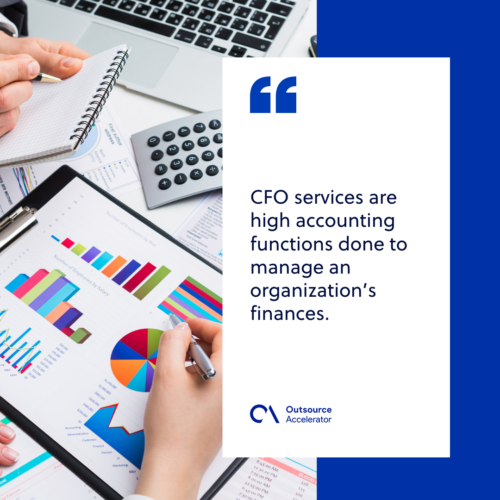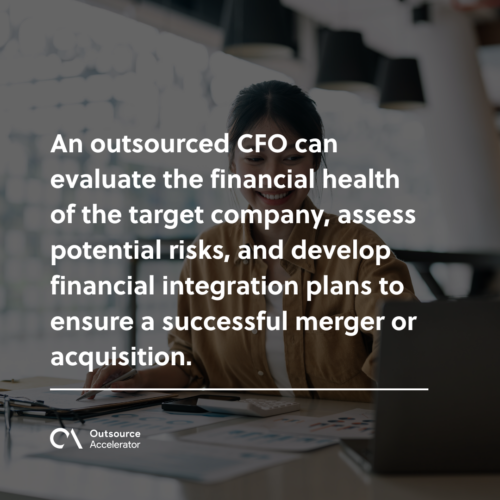Outsourcing CFO services: The role of an outsourced CFO

As companies grow and expand, the need for financial expertise and guidance becomes increasingly important.
Beyond cash flow management, this is when organizations should be more mindful of how they manage their budget and profit for their advantage.
This is where a chief financial officer (CFO) comes into play.
A CFO is responsible for managing a company’s financial health and making strategic decisions that impact its bottom line.
However, not every company has the resources to hire a full-time CFO. Fortunately, outsourcing CFO services has become a viable option since more consultancy firms offer them nowadays.
Find out how outsourcing CFO services contribute to business growth and the role of an outsourced CFO in this article.
Understanding CFO services
CFO services are high accounting functions done to manage an organization’s finances. It covers a holistic set of tasks a CFO does to ensure a company maintains good financial health in the long run.
One of these tasks includes managing bookkeepers and controller teams. CFOs ensure all their procedures undergo checks and balances for compliance and lessened risk of fraud.

Here are the responsibilities under CFO services:
Overall financial analysis
At the heart of CFO services lies the art of financial planning and analysis.
To develop comprehensive financial strategies, CFOs delve deep into your company’s historical and projected financial data. They scrutinize the numbers to align with your business objectives, allowing you to make informed decisions and navigate toward prosperity.
Financial performance analysis
CFOs conduct in-depth analyses of your financial performance. They can define its strengths, weaknesses, and opportunities for improvement.
They recommend strategies to optimize your finances for your company’s advantage.
Cash flow management
CFOs are experts in managing and optimizing cash flow. They work with accountants and bookkeepers, ensuring you have the funds to meet your obligations while making intelligent investments for future growth.
Risk management
The business landscape is fraught with uncertainties, but CFOs are the guardians of financial stability. They identify and mitigate financial risks, devising strategies to protect your company’s financial health and resilience.
Financial reporting and compliance
CFOs are well-versed in navigating financial regulations and compliance. They ensure your company remains compliant with the law while optimizing financial efficiency.
Cost optimization
CFOs are masters of financial efficiency. They analyze your company’s cost structure, identify areas of improvement, and implement cost-saving measures to enhance profitability.
Financial forecasting
Looking into the future is crucial for any business. CFOs employ their financial forecasting skills to predict potential financial outcomes and help you prepare for what lies ahead.
Investment strategy
CFOs provide insights and advice on investment opportunities. They can help you make prudent financial decisions.
Budgeting and expense control
CFOs are wizards when it comes to budgeting. They develop realistic budgets and exercise strict expense control, ensuring your company stays on track financially.
Capital structure management
Your organization should also identify the right mix of debt and equity for your financial health. CFOs analyze your capital structure and recommend optimal financing solutions.
Other CFO services
When acquiring CFO services, you may also take advantage of the following functions:
- Expansion strategies. CFOs play a strategic role in business expansion. They evaluate potential opportunities, assess risks, and advise on expansion plans fit for your growth.
- Tax planning. Taxes can significantly impact your bottom line. CFOs work with tax experts to develop effective tax strategies, minimizing your tax burden while staying compliant.
- Cost-benefit analysis. CFOs conduct cost-benefit analyses to assess the potential returns and risks for major decisions, helping you make well-informed choices.
- Financial education and training. CFOs offer expert advice and provide financial education and training to your finance team to help them make sound financial decisions.
The role of an outsourced CFO
An outsourced CFO is a financial professional who provides strategic financial advice and support to companies on a contract basis. From financial planning and analysis to risk mitigation and budgeting, they take on the responsibilities on behalf of a traditional in-house CFO.
They bring a wealth of experience and expertise, helping businesses make informed financial decisions. In addition,
Why companies opt for outsourcing CFO services
Several reasons constitute why companies choose to outsource CFO services. Let’s take a look at the top three reasons:
Cost-effectiveness
Hiring a full-time CFO comes with a hefty price tag. According to Indeed, a CFO in the US earns an average of US$149,366.00 annually.
Not only do you have to provide a competitive salary, but you also need to consider additional costs such as employee benefits, office space, and training.
By outsourcing CFO services, companies can access top-tier financial expertise at a fraction of the cost of hiring a local one.
Flexibility
Business needs can fluctuate over time, and having a full-time CFO may not always be necessary. Outsourcing CFO services allows companies to scale their financial support up or down based on specific needs.
This flexibility ensures businesses have the right financial expertise when needed without the burden of maintaining a full-time CFO.
Access to specialized expertise
CFO service providers often have a diverse team of finance professionals with specialized expertise in different industries.
By partnering with an outsourcing provider, companies can tap into this wide range of expertise and leverage it to their advantage.
An outsourced CFO brings a depth of knowledge that can drive businesses forward, whether navigating complex financial regulations or implementing robust systems.
Areas where outsourcing CFO services makes sense
Outsourcing CFO services can make sense in various areas of business. Let’s explore five key areas where companies often benefit from outsourcing their CFO services:
Startups and small businesses
With most bootstrapping initially, startups and small businesses often operate with limited resources and budgets. Hiring a full-time CFO may not be financially feasible, especially in the early stages.
Outsourcing CFO services provides them access to high-level expertise without financial strain. This allows startups to focus on core operations while leveraging the financial acumen of their provider.
Rapidly-growing companies
As companies experience rapid growth, their financial needs become more complex. Outsourcing CFO services can help manage this growth by providing strategic financial guidance and scaling financial processes.
An outsourced CFO can evaluate the financial impact of growth strategies, manage cash flow, and implement robust financial reporting systems to support business scaling.
Turnaround situations
Companies facing financial challenges or needing a financial restructuring often require specialized expertise.
An outsourced CFO with experience in turnaround situations can provide the much-needed financial guidance to navigate rough waters. They can identify financial inefficiencies, create a restructuring plan, and implement cost-saving measures to turn the company around.
Mergers and acquisitions
During mergers and acquisitions, the financial implications can be complex and overwhelming.
Outsourcing CFO services can help companies navigate this process by providing expert financial advice and conducting detailed due diligence.
An outsourced CFO can evaluate the financial health of the target company, assess potential risks, and develop financial integration plans to ensure a successful merger or acquisition.
Interim financial leadership
In some cases, companies may experience a gap in their financial leadership due to departures or transitions. Rather than rushing to hire a new CFO, outsourcing these functions can serve as their interim financial leadership.
An experienced outsourced CFO can step in, maintain financial stability, and facilitate a smooth transition until a permanent CFO is found.

Choosing an outsourcing CFO services provider
Choosing the right outsourcing CFO services provider can significantly impact your company’s financial health and success. By partnering with the right firm, you can establish a strong partnership that drives your business forward.
There are certain considerations and best practices to keep in mind when selecting a service provider.
Considerations
Take note of the following when choosing a service provider:
Financial expertise. Look for an outsourcing provider with a track record of working within your industry. They should deeply understand your business’s specific financial challenges and how you can overcome them.
Reputation and references. Reputation speaks volumes about a CFO services provider. Seek recommendations and references from their past clients for insights into their reliability, integrity, and commitment to client success.
Transparent pricing model. Financial clarity should extend beyond your company’s books. Choose a provider with a transparent pricing model that clearly outlines all costs, ensuring no surprises.
Flexibility in service level. Your company’s needs evolve as you grow. This is why finding a provider who can accommodate these changes is crucial.
Data security and compliance. Financial information is sensitive, and you must safeguard it with utmost care. Choose a provider that prioritizes data security and maintains compliance in all interactions.
Timely reporting. Timely and transparent reporting is crucial for monitoring your company’s financial health. Ensure the provider offers detailed and comprehensible reports, empowering you to make informed decisions.
Best practices
Here are some of the best practices to implement when outsourcing CFO services:
Define your objectives. Clearly communicate your company’s financial objectives to the outsourcing CFO services provider. This will align your firm’s efforts toward achieving those goals.
Regular performance reviews. Schedule regular performance reviews with the outsourcing provider to assess their effectiveness and address any concerns or areas for improvement.
Establish clear milestones and deliverables. Set clear milestones and deliverables to align expectations. Regularly review progress against these milestones to track the success of the outsourcing arrangement.








 Independent
Independent




